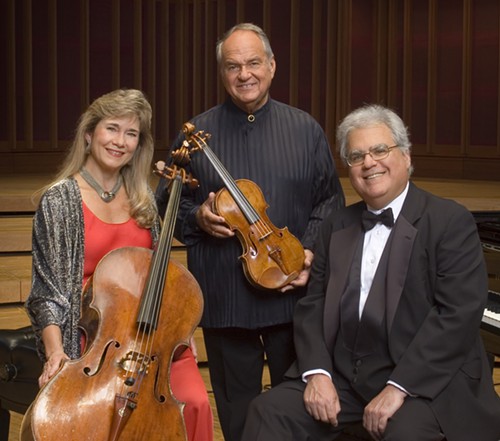KLR Trio delivers brilliant performances for Friends of Chamber Music
The Kalichstein Laredo Robinson Trio’s annual concerts for Miami’s Friends of Chamber Music have consistently offered some of the finest music-making in recent seasons.
On Sunday the players, now nearing their fourth decade together, returned to Gusman Concert Hall for a program with an intriguing premise. In pre-concert remarks, pianist Joseph Kalichstein noted the deep enmity between Brahms and Tchaikovsky despite both composers’ strong romantic impulses. In 1882 both wrote piano trios that have become mainstays of the repertoire. One of the few things the two composers agreed upon was their admiration for Beethoven. Combining the two trios with a Beethoven score from his early period that was completed and revised at the height of the genius from Bonn’s creative powers made for a heady afternoon of chamber literature.
The “Kakadu” Variations are an example of Beethoven’s ability to turn slight material into musical gold. Like his “Diabelli” Variations for piano, the score is based on an undistinguished tune, here the work of one Wenzell Müller. The score’s slow introduction in G minor is itself music of great emotion, depth and pathos. The fluid interplay of piano, violin and cello was beautifully balanced, the musical line natural and flowing. Seamlessly switching gears for the variations, Kalichstein’s piano was dominant, his elegant phrasing marking his affinity for Beethoven’s keyboard writing. The concluding fugue emerged with great clarity, the individual parts cleanly rendered yet blending organically.
Brahms’ Trio No. 2 in C Major is an optimistic, life-affirming score and the musicians’ noble, broadly shaped playing of the opening theme launched a reading that conveyed the music’s uplift and joy. There was plenty of energy and drama in the first movement’s tempest-tossed development and Kalichstein brilliantly assayed the rapid cascade of notes in the coda. Cellist Sharon Robinson and violinist Jaime Laredo brought rich string tone to the dark melodic passion of the Andante con moto, with the vigorous central episode projected with finesse, and Kalichstein reveled in the off-kilter rhythms and spooky ambience of the Scherzo. The trio imbued the Allegro giocoso finale with verve and a broad dynamic range, the withdrawn moments sharply contrasting with the more fervent proclamations.
The brooding Russian angst of Tchaikovsky’s Trio in A minor made a fine contrast to Brahms’ joyous outpouring. Robinson played the opening elegiac melody with great eloquence while Laredo’s gleaming tone infused light into the dark melodic contours. An intense reading of the first movement offered playing that was both steely and soaring, matching the score’s mercurial moods.
The Theme and Variations that comprise the second and final movement can seem long and overblown in routine performances but Kalichstein, Laredo and Robinson made them seem too short in a reading that gave full measure to the principal melody’s imperial Russian grandeur. Kalichstein played the mazurka section with the rhythmic inflection and authority of a fine Chopin player. There was a touch of sinew in the strings for the fugue and the return of the work’s opening theme at the conclusion was suffused with great strength and intensity.
The Friends of Chamber Music season continues with the Hugo Wolf Quartet playing Smetana’s Quartet No. 1 “From My Life” and Dvorak’s Quartet in A-flat Major 8 p.m. February 7 at Gusman Concert Hall in Coral Gables. miamichambermusic.org; 305-372-2975.
Posted in Performances
Leave a Comment
Mon Jan 12, 2015
at 11:40 am
No Comments
